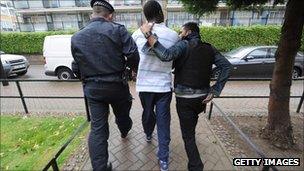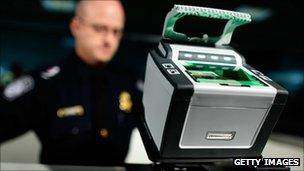England riots: What is the impact of a criminal record?
- Published

More than 2,770 people have been arrested in connection with last week's riots
As the courts deal with some of the hundreds of people charged in connection with the riots, igniting a row over whether the sentences being handed out are too harsh, the BBC asks what is the real cost of a criminal conviction?
When college student Nicolas Robinson set foot in a Lidl supermarket as he walked home from his girlfriend's house, he probably didn't think his actions would land him behind bars.
But stealing a £3.50 case of bottled water during the riots in Brixton has cost the 23-year-old dearly.
Robinson, of Borough, south-east London, is now serving six months in jail.
Justice campaigners, along with some MPs, have said some of the sentences given to those involved in the riots are too harsh while others have said tough penalties show that disorder does have consequences.
But what is becoming clear is that a criminal conviction - no matter how big or small - can have massive implications on a person's ability to lead a full life.
"We are seeing a lot of low-value crimes which are going to have a major effect on the lives of the people who committed those offences," said the BBC's legal correspondent Clive Coleman.
And Mervyn Barrett, of crime reduction charity Nacro, said many of those who played a part in the riots would live to regret their actions in more ways than one.
So what are the practical implications of a criminal conviction?
Employment
The majority of employers will ask about previous convictions and four million Criminal Record Bureau (CRB) checks are carried out every year in England and Wales, said Mr Barrett, head of resettlement information at Nacro.
If a person is not asked about previous convictions by a potential employer there is no legal duty to disclose.
However, if an employer does ask about an unspent criminal conviction a potential employee must disclose the information. If that person lies it is a criminal offence and they could be prosecuted for fraud.
There are large number of professions where convictions can never be spent and must be disclosed, including doctors, nurses, lawyers, teachers and police officers.
Mr Barrett said a heightened awareness of criminal pasts came about when criminal record checks were introduced in the 1980s.
"Once upon a time you could pick up a criminal conviction and it wouldn't matter because only you and a handful of other people would know about it - employers didn't think in terms of criminal records," he said.
"Now we have widespread criminal record checks and I would imagine that in a few years we might have universal record checks.
"You can't escape your past as you could previously - it is a major problem."
If a person has a job and is sent to prison it is very likely they will lose that job, said Mr Barrett, but even if they are not jailed it is possible to be dismissed for gross misconduct.
Study
The tendency is that if a student is applying for health, social care and education courses they will be refused a place if they have a criminal conviction, said Mr Barrett. And if they are already on a course they could be asked to leave.
Even a small conviction for fighting or shoplifting can have a major impact, said Mr Barrett.
"If you are a young person it's absolutely devastating," he said.
"An awful lot of young people are told by the police when they are given a reprimand or caution 'Don't worry about it, it will be off your record in two, three or five years, or when you reach 18 or 21' - none of which is true.
"Police officers say this with the best of intentions but if you pick up a reprimand or caution it will show up on your police record for life."
Most individual universities or colleges post their disciplinary policies on their websites.
Travel
There can be difficulties in getting visas or entering certain countries for those with previous convictions. It is always best to check what the situation is before travelling.

Information on convictions provided to immigration authorities will be considered on a case-by-case basis
In particular, travelling to the USA can be an issue. British citizens can usually travel to the country without a visa but if a person has a criminal conviction they will need one and they must provide background about their conviction.
If a traveller wants a work or residential permit it can be harder because information about previous convictions and proof of good character is required.
"In general (when applying for a visa or permits to live or work) you have to put a criminal conviction in context," said Mr Barrett.
"I suspect that if people put their behaviour into context in relation to the recent riots then it's not going to go down too well."
Housing
As with employers, there is a duty to disclose unspent convictions in an application for a mortgage. If a potential homeowner does not there could be consequences because the mortgage agreement will have been broken.
The prime minister has backed plans for people who "loot and pillage their own community" to be evicted from council houses.
Wandsworth in London became the first council to serve an eviction notice over the riots, while Nottingham City Council, Salford City Council and Westminster, Greenwich and Hammersmith and Fulham councils in London are all considering the move.
Insurance
A person with previous convictions can find it almost impossible to get any kind of insurance.
"The reality is that if your convictions are not spent you will be expected to disclose that and having disclosed it you may well be refused insurance entirely or you may find that premiums are sky high," said Mr Barrett.
Wider implications
Mr Barrett said that aside from the practical implications there were often psychological implications - sometimes years after a person committed the crime.
"What is always evident from the calls we get is the degree of shame people feel about their past behaviour," said Mr Barrett.
"Shame and embarrassment is often a greater problem than the practical problems offenders face.
"Those people involved in the recent looting and rioting who are being processed by the courts at the moment - many of them are going to spend the rest of their lives either regretting [their behaviour] or finding that it comes back to haunt them from time to time because in a world with criminal record checks you really can't escape your past."